| Srl | Item |
| 1 |
ID:
069829
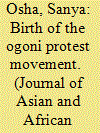

|
|
|
| 2 |
ID:
165066
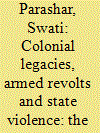

|
|
|
|
|
| Summary/Abstract |
This article examines the connected histories of armed tribal and peasant revolts in colonial and postcolonial India with reference to the ongoing Maoist conflict in rural and tribal areas of central and eastern India. The article makes two interrelated arguments about the violent continuities that endure from colonial to postcolonial contexts: (1) the nation-state system, in its efforts to establish control and influence, creates a hierarchy of citizenship engaging in the hostile policing of marginalised subjects, thereby engendering armed revolts and political violence; (2) the postcolonial state’s response to these armed revolts by marginalised subjects who challenge its sovereignty and monopoly over violence, is equally violent and repressive. Most significantly, the state’s response is legitimised in the same colonial idioms and justifications that mark epistemic and physical violence against the third world.
|
|
|
|
|
|
|
|
|
|
|
|
|
|
|
|
| 3 |
ID:
157926
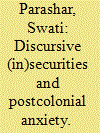

|
|
|
|
|
| Summary/Abstract |
This article queries the intimate relationship between militarism and the state, which is seen as the by-product of ‘postcolonial anxiety’ (Krishna, 1999) related to the survival of the nation-state in the Third World. This anxiety enables militarism at various levels of governance and state interventions in the everyday lives of the citizenry. The article engages with the historical trajectory of the Indian state to argue that its ‘postcolonial anxiety’ engenders militarism not in the immediate aftermath of independence from colonial rule, as in other postcolonial states, but as an anomaly since the end of the Cold War and the advent of globalization. The Indian state rejected militarism immediately after independence, but subsequently used it sporadically to deal with armed insurgencies in the 1970s and 1980s. The popular endorsement of militarism in India coincides with the globalized world order of the 1990s, the move to democratize ‘security’ in discourse and practice, and the adoption of neoliberal developmentalism to ‘catch up’ with the ‘modern’ trajectory of the European nation-states. I argue that this has led to ‘excessive militarism’ that thrives on the shared consensus between the state and citizens that security is a collective enterprise in which the material and affective labour of militarism must be performed by both sides. Citizens embrace military logics and military ethos, both to contest the state’s violence and to confer legitimacy on the state and secure development benefits. The article concludes that militarism opens up new spaces for understanding the complex statebuilding processes of postcolonial societies, the fraught and textured relationship between the state and citizens, and the constant tensions and negotiations between civilian lives and military culture.
|
|
|
|
|
|
|
|
|
|
|
|
|
|
|
|
| 4 |
ID:
095675
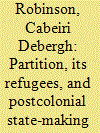

|
|
|
| 5 |
ID:
131009
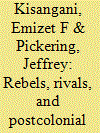

|
|
|
|
|
| Publication |
2014.
|
| Summary/Abstract |
A recent, notable strain of empirical research argues that postcolonial state-building follows a pattern similar to the European state-building experience. It acknowledges that war is less common today, but contends that interstate rivalry now drives state-building. We argue that postcolonial state-managers have little reason to build state capacity in response to rival states. There is only a slight chance that these rivalries will escalate into an existential threat for the government. Attention should instead be focused on the more tangible threat posed by transnational rebels and postcolonial governments' use of low-scale military force to combat such non-state actors. Using interrupted time series methodology on a sample of 72 countries from 1972 to 2002, we find that postcolonial state military intervention against transnational rebels increases direct taxes (a measure of state penetration) and non-tax revenue (state autonomy) collected by governments, while intervention against rival states reduces direct taxation.
|
|
|
|
|
|
|
|
|
|
|
|
|
|
|
|
| 6 |
ID:
174559
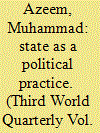

|
|
|
|
|
| Summary/Abstract |
The emphasis since the 1990s in the neoliberal paradigm on the non-interventionist state, and the theoretical disinterest in the state by critical scholarship, has negatively affected the prospects for political and social change. The fragmented and dispersed social movements analysed by critical scholars have proven insufficiently counter-hegemonic. All this invites us to reconsider the postcolonial state at a new theoretical level to guide better choices for political practice. This article analyses the prevalent academic literature on the postcolonial Pakistani state. In these analyses, an omnipresent and omnipotent military state decides the fate of democracy, now and again replacing politicians at the helm and also promoting Islam. Political practice remains confined to inter-elite struggles for the restoration of democracy, whereas imperialist hegemony and the role of marginalised classes as reservoirs of counter-hegemony are largely missing. This article critically builds on the legacy of the renowned Pakistani scholar Hamza Alavi to show, historically and empirically, how imperialist powers (from the United States to China) have used the military as a seat of power to bring the local elite under their hegemony. A political theoretical practice and the building of a counter-hegemony which goes beyond and beneath inter-elite struggles is much needed.
|
|
|
|
|
|
|
|
|
|
|
|
|
|
|
|